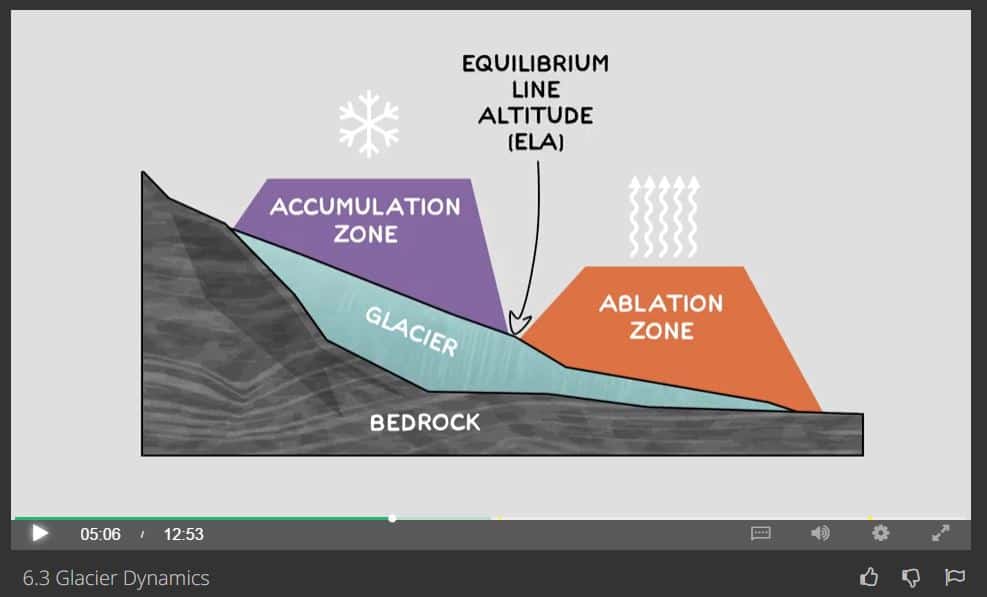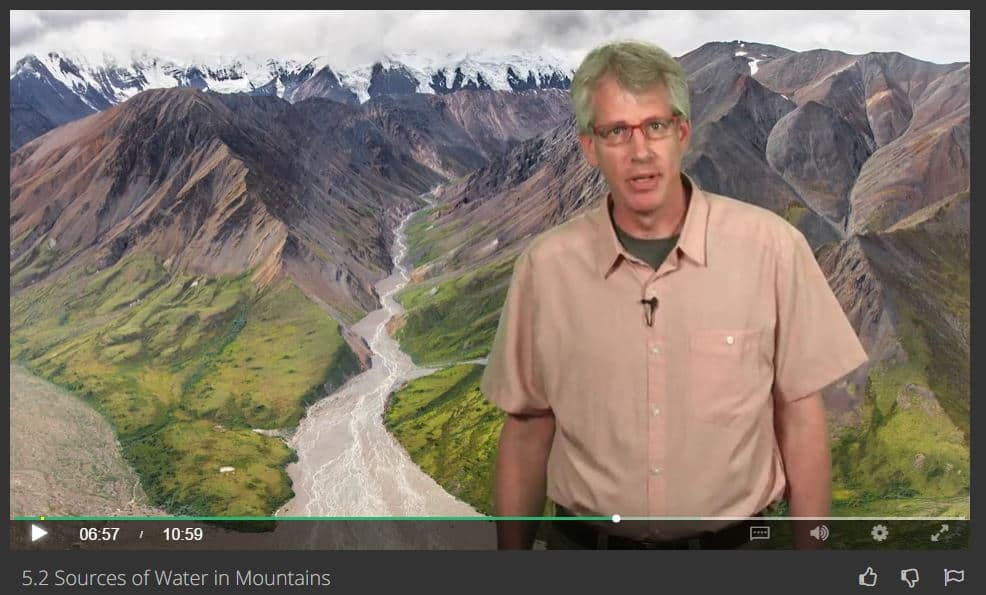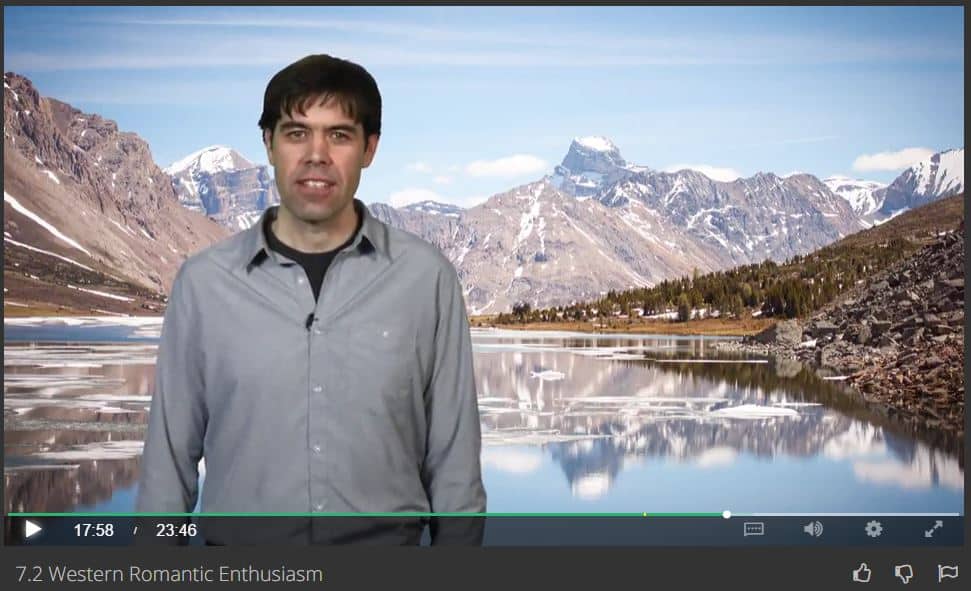In-Depth Review: Mountains 101 MOOC on Coursera
Learn about the world’s mountain ecosystems, geological processes and the effects of climate change while enjoying the stunning scenery.
Took the course? Write your own review here. Read all reviews.
If you enjoy the great outdoors, stunning scenery or learning about a variety of plants, animals and geological processes, this course could be for you. Not only does it explain how mountains are formed and degraded, it also teaches us about glaciers, the water cycle, and why mountain habitats change as the elevation increases. Mountain ecosystems are visited and adaptations of plants and animals to life in the cold, rugged landscape and sparse atmosphere are described. Various specific mountains are featured in the discussion of mountains in folklore, legends, and art. The effect of climate change on the world’s mountains is analysed. As well, each week features a short video with practical tips on a different aspect of hiking and camping in the mountains.

Why I Chose This Course
Being interested in the natural world I was intrigued when I saw “Mountains 101” in the Coursera “Recommended courses for you” email. The course introduction mentions it is “a broad and integrated overview” and an “interdisciplinary field of study focusing on the physical, biological, and human dimensions of mountain places”. Better and better! I am constantly fascinated by the way everything in the world is connected, how ecosystems work and how living things have evolved for their individual niches.
I am pleased to report that I wasn’t disappointed in this course. As well as the basics, which make it suitable for everyone, it includes plenty of in-depth information to keep my interest even though I have completed a number of MOOCs on geological and biological topics. The instructors have a refreshing style and few lecture videos are longer than twenty minutes. And did I mention the scenery? Many breathtaking views of mountains in Canada and around the world make watching the videos a pleasure.
Instructors

Mountains 101 is presented by the University of Alberta, Canada. Professor David Hik from the Biological Sciences department and Assistant Professor Zac Robinson from the Physical Education and Recreation department are clearly both passionate about mountains and their role in Earth’s ecology. They have enlisted specialists in a range of fields to present segments of the course, such as staff from Canada’s national parks agency (Parks Canada), a glaciologist, a geophysicist, even a professor of English to discuss the role of mountains in influencing literature.
Assessment
Assessment for the course is made up of twelve weekly quizzes worth 8% or 9% each. By thinking carefully about the materials presented each week and some repeats of quizzes, I was able to score 100%. Unlike some Coursera courses, the assessments are available without cost, although if you want a certificate you will need to purchase it.
The Course

A considerable strength of this course is the range of topics and locations mentioned during the twelve weeks. Mountains from every continent (and many islands) are mentioned, including the Transantarctic Mountains which are perpetually covered with ice, and the Australian Alps which, with the forecast rate of climate change, are likely to be below the snow line in about fifty years. A sobering thought for this Australian. Fascinating snippets include why it’s colder in the mountains, how convection storms form and the risks of legacy pollutants such as DDT in melting glacier ice. What exactly causes Acute Mountain Sickness (altitude sickness) and why Tibetan, Ethiopian and Andean highlanders are able to live at high altitudes and low oxygen levels without any apparent complications are also discussed.
Did you know that the tree line in mountainous regions is determined by summer temperatures during the growing season, not the freezing winter temperatures? This course also touches on historical stories & indigenous legends of mountainous regions all over the world, from Japan and China, through other Asian countries, including in the Himalayas, through early European attitudes to mountains and on to the Americas. There is even a quote about mountain weather written by Homer in “The Iliad”. Two unusual and enjoyable aspects of this course were the interactive world map and the weekly “Tech Tips” videos. The interactive world map is available most weeks to locate mountains and ranges discussed in the course videos. Each week has its own map, and I would have liked to see a final summary map with all the places from the course on it.
Tech Tips videos ranged from one to five minutes long, with most around three minutes. They were presented by mountain guide Matt Peter and graduate student Laura Redmond. Tech tips discussed include how to choose footwear to avoid blisters (but also how to deal with blisters if you develop any), clothing, food, camping and plenty of guidelines to keep safe while in the mountains. They should be compulsory watching for anyone planning to hike or camp in the mountains.
The weekly course notes are a handy memory-jogger of many main points. There were occasional distracting typos in the course notes (e.g. Lesson 11 – “Tourism is today regarded world as vital for economic development and survival”), but generally they were well written. Recommended reading includes books which can be purchased, as well as websites and freely available scientific papers. There are even visits from two well-known public figures (watch the course videos to meet them). Although it is a 12-week course, the weekly time commitment is not large. On Coursera’s current platform, it’s possible to go full steam ahead and finish it in a much shorter time, which I did. I couldn’t wait to go through all the material!
Conclusion
I thoroughly enjoyed this course and have marked International Mountains Day on December 11th in my diary.
[review_widget]
Class Central is looking for reviewers and regular contributors. If you’ve ever finished a MOOC and want to write a critique to help future students considering taking that course, we want to hear from you. Drop us a mail.






Gaurav Vyas
Hello Pat, Thank you for writing this detailed review of Mountain 101. I enjoy reading this review as much as you enjoyed writing it. I am about to take this course. As you might already know this course has been made free due to the response of COVID-19 on Coursera, with the free upgrade to a certificate. Looking forward to reading more reviews from you!